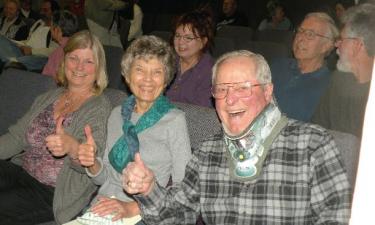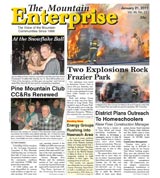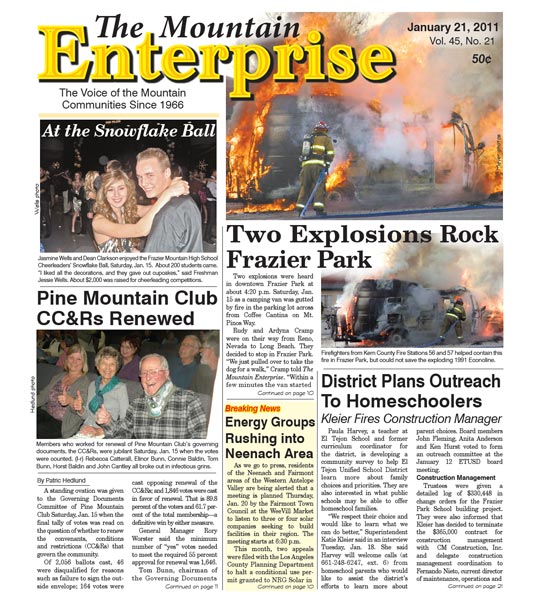
Members who worked for renewal of Pine Mountain Club’s governing documents, the Conditions, Covenants and Restrictions (CC&Rs), were jubilant Saturday, Jan. 15 when the votes were counted. (l-r) Rebecca Catterall, Elinor Bunn, Connie Baldin, Tom Bunn, Horst Baldin, John Cantley.
By Patric Hedlund
A standing ovation was given to the Governing Documents Committee of Pine Mountain Club Saturday, Jan. 15 when the final tally of votes was read on the question of whether to renew the convenants, conditions and restrictions (CC&Rs) that govern the community.
Of 2,056 ballots cast, 46 were disqualified for reasons such as failure to sign the outside envelope; 164 votes were cast opposing renewal of the CC&Rs; and 1,846 votes were cast in favor of renewal. That is 89.8 percent of the voters and 61.7 percent of the total membership—a definitive win by either measure.
General Manager Rory Worster said the minimum number of “yes” votes needed to meet the required 55 percent approval for renewal was 1,646.
Tom Bunn, chairman of the Governing Documents Committee said he had “aged 50 years,” in the course of getting the CC&Rs renewed.
Committee members Lee Krimm and John Cantley credited the work of community volunteers who made and placed signs throughout the community, participated in telephone trees and talked with their neighbors about the pros and cons of letting the CC&Rs lapse, versus voting to renew them.
There was a moderate amount of debate in the community about the measure. Some community members, such as Carlos L’Dera and David Culp, circulated email screeds asserting that little would change if the CC&Rs failed to pass.
Culp argued that homeowners should withhold their votes until members of the board of directors “showed good faith” by closing the Bistro on the Greens restaurant, which he characterized as being a subsidized luxury for a few “elite.”
In August 2010 it was estimated that each homeowner in the community pays between $40-$70 a year to help maintain the clubhouse restaurant, which does not operate at a profit.
Culp also argued that a corporate structure is not a good organizational model for governing a community. Pine Mountain Club is a nonprofit corporation.
Culp argued that the rights of individuals are not adequately prioritized in the governing documents and that municipal law would be better suited to governing a community. He did not propose a practical plan for making that transition.
According to many who appreciated his efforts or found them entertaining, his essays were compelling but flawed by lack of fact-checking on important points and a tendency to call those with whom he disagrees insulting names.
A controversial move by the board of directors to cast votes on behalf of the 62 parcels owned by PMCPOA itself was not a factor in the victory. The CC&Rs would have been approved without those votes, with 138 left to spare. A notable 68.7 percent of the members voted; 61.7 percent approved renewal; 5.5 percent voted ‘No;’ and 2 percent of the votes were disqualified.
This is part of the January 21, 2011 online edition of The Mountain Enterprise.
Have an opinion on this matter? We'd like to hear from you.


